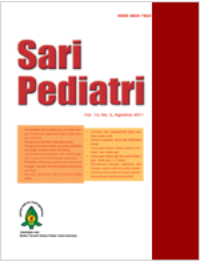Infeksi Saluran Kemih Sebagai Penyebab Kolestasis Intrahepatik
Sari
Diagnosis banding etiologi kolestasis intrahepatik (KIH) pada bayi sangat beragam,
salah satu di antaranya adalah infeksi dan yang tersering adalah infeksi saluran kemih
(ISK). Infeksi saluran kemih pada KIH akan mempunyai prognosis baik bila dapat
didiagnosis dan diobati. Pengamatan sehari-hari di Departemen Ilmu Kesehatan Anak
FKUI/RS Dr. Cipto Mangunkusumo didapatkan kesan bahwa ISK pada KIH cukup
sering ditemukan. Penelitian ini bertujuan untuk mengetahui prevalensi ISK pada bayi
dengan KIH dan mengetahui karakteristik pasien tersebut. Subyek adalah bayi dengan
kolestasis intrahepatik yang berusia kurang dari 1 tahun yang datang berobat di Divisi
Gastrohepatologi di Departemen Ilmu Kesehatan Anak FKUI/RSCM pada periode
Januari sampai dengan Desember 2003. Diagnosis ISK ditegakkan bila ditemukan
bakteriuria lebih dari 100.000 cfu/mL. Hasil penelitian ini mendapatkan prevalens ISK
pada bayi dengan KIH sebesar 24 dari 34 subyek, dengan dominasi lelaki (3:1). Bakteri
penyebab tersering adalah bakteri Gram negatif ditemukan sebanyak 21 dari 24 subyek.
Pada lima belas dari 24 orang di antaranya ditemukan E. coli. Tidak ada gejala klinis
yang spesifik pada kolestasis dengan ISK. Gejala demam ditemukan pada 3 dari 24
subyek . Leukosituria ditemukan pada 1 dari 24 subyek dengan ISK. Oleh sebab itu
dianjurkan untuk melakukan pemeriksaan biakan urin untuk mendeteksi ISK.
Kata Kunci
Teks Lengkap:
PDFReferensi
Suchy FJ. Approach to the infant with cholestasis.
Dalam: Suchy FJ, Sokol RJ, Balistreri WF, penyunting.
Liver disease in children. Edisi kedua. Philadelphia:
Lippincott William & Wilkins; 2001. h. 187-94.
Trauner M, Fickert P, Stauber RE. Inflammation-induced
cholestasis. J. Gastroenterol hepatol 1999; 14:846-59.
Seeler RA, Hahn K. Jaundice in urinary tract infection
in infancy. Am J Dis Child 1969; 118:553-9.
Ng SH, Rawstron JR. Urinary tract infections presenting
with jaundice. Arch Dis Child 1971; 46:173-6.
Rosenthal P. Neonatal hepatitis and congenital infections.
Dalam: Suchy FJ, Sokol RJ, Balistreri WF,
penyunting. Liver disease in children. Edisi kedua. Philadelphia:
Lippincott William & Wilkins; 2001. h. 239-
Chavalitdhamrong P, Escobedo MB, Barton LL,
Zarkowsky H, Marshall RE. Hyperbilirubinemia and
bacterial infection in the newborn. Arch Dis Child 1975;
:652-4.
Rooney J, Hill DJ, Danks DM. Jaundice associated with
bacterial infection in the newborn. Am J Dis Child 1971;
:39-41.
Garcia FJ, Nager AL. Jaundice as an early diagnostic
sign of urinary tract infection in infancy. Pediatrics 2002;
:846-51.
American Academy of Pediatrics, Provisional Committee
for Quality improvement and Subcomittee on Hyperbilirubinemia.
Practice parameter: management of
hyperbilirubinemia in the healthy term newborn. Pediatrics
; 94:558-65.
Heldrich FJ, Barone MA, Spiegler E. UTI:diagnosis and
evaluation in symptomatic pediatric patient. Clin Pediatr
; 39:461-71.
Zimmerman HJ, Fang M, Utili R, Seeff LB, Hoofnagle
J. Jaundice due to bacterial infection. Gastroenterology
; 77:362-74.
Miller DJ, Keeton GR, Webber BL, Saunders SJ. Jaundice
in severe bacterial infection. Gastroenterology 1976;
: 94-7.
Crain EF, Gershel JC. Urinary tract infections in febrile
infants younger than 8 weeks of age. Pediatrics 1990;
:363-7.
Crawford JM, Boyer JL. Clinicopathology conferences:
Inflammation-induced cholestasis. Hepatology 1998;
: 253-60.
Simpson KJ, Lukacs NW, Colletti L, Strieter RM,
Kunkel SL. Cytokines and the liver. J. Hepatol. 1997;
: 1120-32
Crawford JM. Cellular and molecular biology of the
inflamed liver. Curr. Opin. Gastroenterol. 1997; 13:175-
Escobedo MB, Barton LL, Marshall RE, Zarkowsky H.
The frequency of jaundice in neonatal bacterial infections.
Clin. Pediatr. 1974; 13:656-7.
Abbot GD. Neonatal bacteriuria: a prospective study of
infants. Br Med J 1972; 1:267-9.
Edelman CM, Ogwo JE, Fine BP, Martinez AB. The
prevalence of bacteriuria in full-term and premature
newborn infants. J Pediar 1973; 82:125-32.
DOI: http://dx.doi.org/10.14238/sp6.4.2005.166-71
Refbacks
- Saat ini tidak ada refbacks.
##submission.copyrightStatement##
##submission.license.cc.by-nc-sa4.footer##
Email: editorial [at] saripediatri.org


Sari Pediatri diterbitkan oleh Badan Penerbit Ikatan Dokter Anak Indonesia
Ciptaan disebarluaskan di bawah Lisensi Creative Commons Atribusi-NonKomersial-BerbagiSerupa 4.0 Internasional.




